This piece comes to us from Dr. Emily Darling, a conservation scientist with WCS (Wildlife Conservation Society) who leads WCS’s global coral reef monitoring program.
In late February, I was with a team of scientists from WCS (Wildlife Conservation Society) underwater on one of the Caribbean’s isolated atolls: Glover’s Reef in Belize.
The golden late afternoon sunlight bent through the water’s depths and we breathed compressed air from our SCUBA tanks. We moved quietly through the reef, recording gorgonian soft coral fans swaying in the light current and tallying small reef fishes on our underwater clipboards as they gently schooled around sponges or hard corals.
This would turn out to be the last ‘normal’—my last glimpses of the underwater world I love for… no one’s really sure for how long. One week later, the World Health Organization announced a global pandemic. Countries closed their borders and locked down. In the next few days, our NGO grounded all international travel. Field work was cancelled. Offices closed and shuttered.
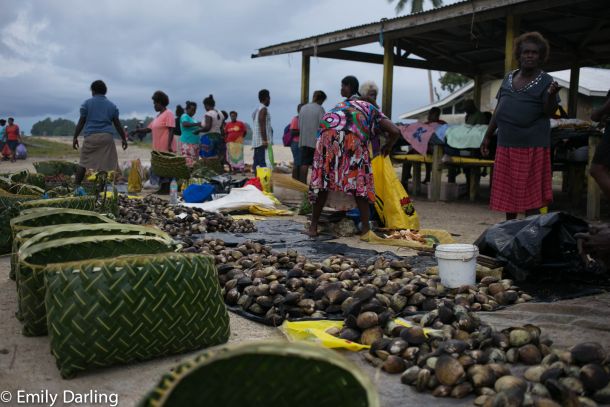
Fisherwomen selling reef fish and clams at a community market in the Solomon Islands. Photo credit: Emily Darling/WCS.
Instead of deep on a reef, I was deep with worry about friends and colleagues around the world struggling in unique ways through an unprecedented pandemic. Amid these changes, every single day I ask myself how the work we do as scientists and conservationists can help communities in this time of crisis and change.
As a marine biologist, one thing that surprises people is how closely we work with people, particularly communities who own and steward their local resources. My colleagues are frontline conservation workers who partner with hundreds of coastal communities, from Fiji and Papua New Guinea to Kenya and Cuba. These are long-term relationships, and these partnerships span years and decades.
Our commitment to communities does not stop during this crisis, or any.
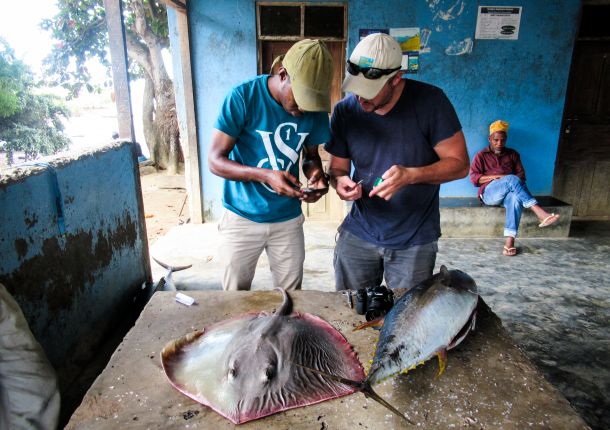
WCS scientists work with local fishers in Tanzania to take species and size information from the day’s catch. This data helps WCS track the health of local coral reef ecosystems over time. Photo credit: Mike Markovina/WCS.
In 2016, a Category 5 cyclone, the most destructive to make landfall in the Southern Hemisphere, ripped through Fiji. Villages on the islands of Koro, Ovalau, and across the Vatu-i-Ra seascape lost lives, homes, fishing gear, and crops. WCS Fiji organized trucks of food aid, and supplies were delivered by hand after navigating damaged roads and long haul ferries, sometimes the first relief to reach remote villages.
Last year, I stayed with these same communities, and this kindness and support was remembered and reciprocated with lavish Sunday feasts of fresh fish, local clams, and prized seaweeds.
But the COVID-19 crisis is different. Bringing assistance can also mean bringing an invisible virus, even more deadly for remote villages days away from hospitals. Many countries like Fiji were quick to ban social gatherings and travel.
Around the world, WCS field teams are adapting to the pandemic and changing the way that they work to better serve their communities:
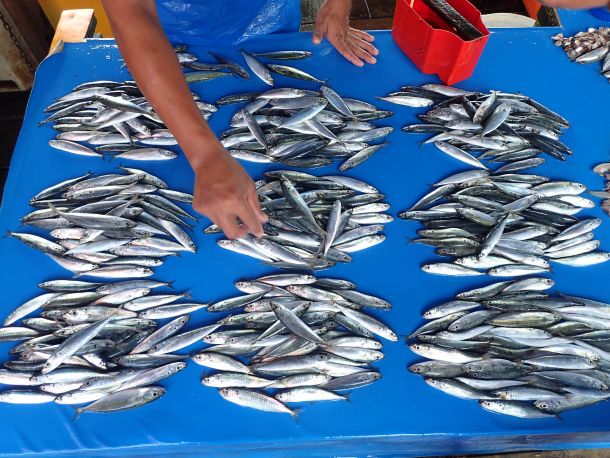
An Indonesian fisher sorts his catch to sell. Photo credit: Emily Darling/WCS.
In Indonesia, a country-wide semi quarantine has shifted communications online. In Aceh province, the WCS Indonesia Program is bringing government officials to their first online conference calls in order to continue our work on developing provincial-level action plans already in draft form to combat destructive fishing on coral reefs.
The plan, drafted based on consultations with local communities and government bodies before the crisis, aims to rebuild fisheries in the province. More widely across the country, WCS is conducting weekly phone surveys of people from over 40 communities in order to document the community-level impacts of major changes in two key sectors: fisheries and tourism.
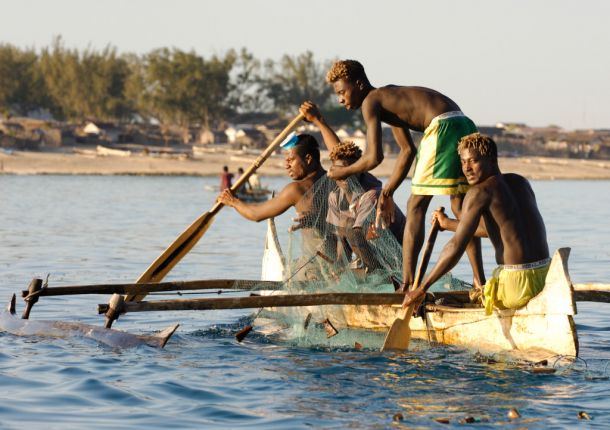
Local fishers return home, nets in hand, after a day’s work in Madagascar. Photo credit: Julie Larsen Maher © WCS.
In Madagascar, tourism has collapsed. Prices for fish, octopus, and calamari have plummeted to less than half of their normal prices, leaving fishers struggling to support themselves. To meet basic needs, WCS staff are delivering masks and soap to vulnerable communities, sharing information about the pandemic and the links between human health and the environment.
In Fiji, COVID-19 has coincided with a category 4 cyclone, followed by heavy seasonal rains that have brought outbreaks of waterborne diseases like typhoid fever. As a national lockdown carefully lifts, WCS teams are working with health officials to detect incidences of waterborne diseases and study how these outbreaks are related to human activities on land.
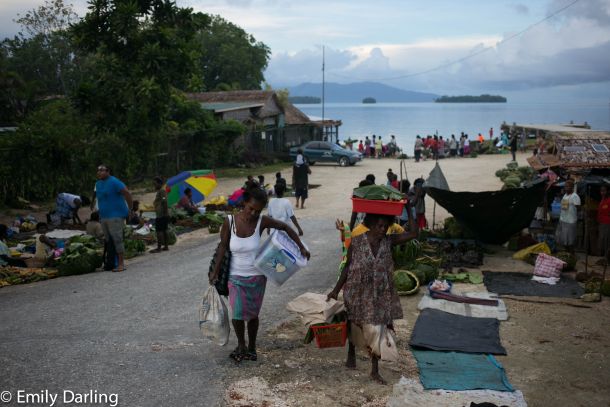
Community members buying and selling goods at a local market in the Solomon Islands. Photo credit: Emily Darling/WCS.
As global supply chains struggle around the world due to COVID-19, local food is more important than ever. For many coastal communities, food comes from farming and fisheries. Our work as conservationists to ensure that local resource management delivers joint benefits for people and nature is more important than ever. We engage closely with communities to prioritize science that responds to their most urgent local problems.
A recent study by WCS scientists found that improving education, strengthening access to markets, and rebuilding coastal ecosystems are crucial to enabling people to adapt and endure amid change—from global warming to this global pandemic.
COVID-19 has reframed how we think about conservation and sustainable resource management. Protecting ecosystems and the communities that depend on them can’t be deferred to the next decade. Local food chains like fisheries need to be sustainably managed now so that people can feed their families.
Our work at WCS continues through the pandemic. From home offices in more than 60 countries, we check in daily with colleagues and keep our work serving wildlife and wild places moving forward. We are all thinking broadly about the interconnected future of our planet’s ecosystems, natural resources, and human health.
As an applied scientist, my job is to provide evidence and answers to the questions asked by the people who need them the most. We will continue providing the support, science, and guidance to help communities benefit from the resources they own and steward, especially in this time when they are relying on them more than ever.
We would like to extend a warm thank you to our colleagues in the field around the world who contributed their expertise to this article:
Ravaka Ranaivoson, Bebe Jean Raharinosy, and Abdoul Santisy, WCS Madagascar Program
Sangeeta Mangubhai, WCS Fiji Program
Ina Nisrina and Peni Lestari, WCS Indonesia Program
